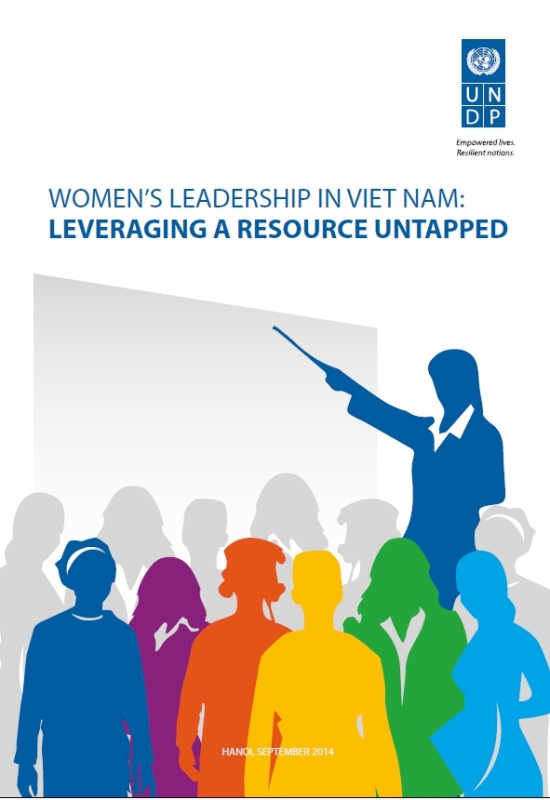Women’s Leadership in Viet Nam: Leveraging a Resource Untapped
Executive Summary
The purpose of this report is to provide direction in the implementation of leadership and management training programmes in Viet Nam that will increase the representation and authority of women in the civil service and political sphere. The report identifies gaps in existing programmes in Viet Nam that train women for elected office and public administration, and assesses how an array of global leadership and public service training models can be leveraged. The recommendations consider how challenges for women, specific to Viet Nam’s political environment, can be addressed with culturally sensitive approaches that will both enhance their skills and expand opportunities.
The report reviews existing political and public sector training programmes of 12 organizations and agencies within Viet Nam, in addition to 16 noteworthy programmes from around the world. The lessons drawn from this study identify best practices for an effective training programme for women in Viet Nam. Specific attention has been given to the level of gender-responsiveness and overall quality of leadership training for women and men in Viet Nam and globally.
…….
All activities to support more robust participation of women in political leadership must be accompanied by advocacy among men and women, as well as policy and regulatory changes that show commitment to shared leadership and value for more diverse contributions to public policy. The combination of these efforts will begin to address the barriers to gaining power and exercising leadership that women continue to face. With training alone, women will not advance. Changing perceptions about women’s capacity to lead is also required.
This, in turn, will create a more inclusive, gender-responsive government that is able to better serve its citizens. A government that is more representative of its citizens will allow the country to leverage and include a broader range of perspectives and, presumably, more diverse approaches to public policy challenges.
Specifically, this report recommends that political and public sector leadership and management training programmes that advances women’s position in Viet Nam should meet the following requirements:
1. A leadership initiative for women must address their access to power – this requires addressing formal and informal barriers. These include barriers related to Viet Nam’s political system and perceptions and societal expectations based on culture and social norms.
2. Addressing the range of barriers to women’s leadership cannot be accomplished through training or skills development alone. Other types of support are needed, such as supplementing training with hands-on activities that directly advance women’s credentials and develop women’s confidence or support networks. This will require an overall shift in the vision for training on women’s political leadership in Viet Nam to more comprehensive support through several means.
3. The initiative must also educate men and women alike about the value of their shared leadership. Work with men and women is needed to convey the value of women’s contribution to political processes, in order to cultivate a conducive environment for shared leadership in which both sexes can thrive as exceptional leaders. This requires integrating and addressing the perspective of men and women in all political and public sector training.
4. Women at all levels of government must be targeted with opportunities for political and policy-related leadership training, such as skills building, as well as additional support like mentoring, that improves their advancement and contributes to their performance.
5. Discriminatory regulations that affect women’s advancement in public life should be assessed and mitigated in a women’s leadership initiative. Programmes must overcompensate for the negative impacts of discrimination in order to accelerate promotion and leadership opportunities for civil servants. Advocacy on legal reform to counter these barriers may comprise part of this effort.
6. Gender equality, not simply gender parity, must be included explicitly in the training objectives and strongly woven into every aspect of the programme, beginning with its planning and design phase, throughout implementation and monitoring for impact. This requires moving beyond the quantitative approach of solely using gender as a criterion for selecting trainers, speakers and participants, to engender attitudinal and behavioural change among women and men on the issue of women’s leadership.
7. Reform and upgrade existing mandatory and other public sector leadership programmes. Government accountability to ensure a minimum of 30 per cent participation of women in all political courses is essential.
8. Accelerate direct credentialing opportunities specifically for women civil servants by expanding training to women at all levels, not just the most senior women. Align new and existing programmes directly with credentials for women that count toward promotion to more aggressively facilitate their professional mobility.
9. Consider the value of existing infrastructure and knowledge within current initiatives and identify opportunities to collaborate or maximize resources across organizations and the Government. Examine partnerships that leverage technical strengths, relationships and other opportunities (such as implementation of government-credentialing programmes like the ones run by the Ho Chi Minh National Academy of Politics and Public Administration (HCMA) and the Viet Nam Women’s Union (VWU) network, or the gender-sensitive curricula of VWU, the Empowerment of Women in the Public Sector project (EOWP)[1], the National Economics University (NEU) and the Ministry of Labour, Invalids and Social Affairs (MOLISA)). Other criteria could include available infrastructure and human resources (e.g. classrooms, trainers, materials and websites), sustainable government funding and a long-term mandate, gender-based participation and trainer criteria, specialized training by experience level, gender and sector that integrates gender, and flexibility to align training with other activities that meet the challenges of women’s participation.
10. A thorough gender-based needs assessment and analysis should be used when designing leadership training programmes. The programmes must ensure enough time for participants to engage in experiential learning, encompass follow–up with participants, cultivation of alumnae networks and other means of ongoing support.
11. Long-term government investment in training and sustainable financial support is required for meeting the personal and professional needs of women seeking leadership in the public sector. This must include a financially sustainable programme that enables continuity over time.
12. Funded by the Government, programmes should combine technical support from international donors, particularly on curricula. This approach leverages the content of non-government partners which tends to be more progressive in its inclusion of a gender-sensitive and current approach.
13. Monitoring and evaluation, particularly impact evaluations, must be a core component of any programme to measure success and allow for modifications to approach for improved impact.
14. Combining Vietnamese and international trainers and curriculum developers will ensure the highest level of quality.
[1] The name of this project changed in 2013 to the Women’s Leadership Project.
Full text of Women’s Leadership in Viet Nam: Leveraging a Resource Untapped: kristenreporten20140916v3.pdf

- Hôm nay 484
- Tổng lượt truy cập 6,864,664


Bình luận từ Facebook
Phản hồi